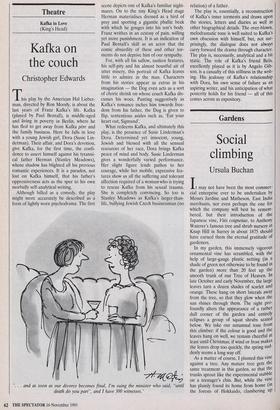Theatre
Kafka in Love (King's Head)
Kafka on the couch
Christopher Edwards
This play by the American Hal Lieber- man, directed by Ron Moody, is about the last years of Franz Kafka's life. Kafka (played by Paul Bentall), is middle-aged and living in poverty in Berlin, where he has fled to get away from Kafka pere and the family business. Here he falls in love with a young Jewish girl, Dora (Susie Lin- derman). Their affair, and Dora's devotion, give Kafka, for the first time, the confi- dence to assert himself against his tyranni- cal father Herman (Stanley Meadows), whose shadow has blighted all his previous romantic experiences. It is a paradox, not lost on Kafka himself, that his father's oppressiveness acts as the spur to his own morbidly self-analytical writing.
Although billed as a comedy, the play might more accurately be described as a form of lightly worn psychodrama. The first scene depicts one of Kafka's familiar night- mares. On to the tiny King's Head stage Herman materialises dressed as a bird of prey and sporting a gigantic phallic beak with which he gouges into his son's body. Franz writhes in an ecstasy of pain, willing yet more punishment. It is an indication of Paul Bentall's skill as an actor that the comic absurdity of these and other tor- ments do not deprive him of our sympathy.
For, with all his sallow, sunken features, his self-pity and his almost boastful air of utter misery, this portrait of Kafka leaves little to admire in the man. Characters from his stories appear as extras in his imagination — the Dog even acts as a sort of choric shrink on whose couch Kafka dis- cusses his woes. Panting suggestively as Kafka's romance inches him towards free- dom from his father, the Dog is given to flip, sententious asides such as, 'Eat your heart out, Sigmund'.
What redeems Kafka, and ultimately this play, is the presence of Susie Linderman's Dora. Determined yet innocent, young, Jewish and blessed with all the sensual resources of her race, Dora brings Kafka peace of mind and body. Susie Linderman gives a wonderfully varied performance. Her slight figure lends pathos to her courage, while her mobile, expressive fea- tures show us all the suffering and tolerant affection required of a woman' who is trying to rescue Kafka from his sexual trauma. She is completely convincing. So too is Stanley Meadows as Kafka's larger-than- life, bullying Jewish Czech businessman (no
. . and as soon as our divorce becomes final, I'm suing the minister who said, "u (ii death do you part", and I have 300 witnesses,' relation) of a father.
The play is, essentially, a reconstruction of Kafka's inner torments and draws upon the stories, letters and diaries as well as other biographical details. The over-blown, melodramatic tone is well suited to Kafka's own obsession with himself, but, not sur- prisingly, the dialogue does not always carry forward the drama through character. The play is, necessarily, analytical and a bit static. The role of Kafka's friend Bela, excellently played as it is by Angelo Gib- son, is a casualty of this stillness in the writ- ing. His jealousy of Kafka's relationship with Dora, his own sense of failure as an aspiring writer, and his anticipation of what posterity holds for his friend — all of this comes across as expository.










































































 Previous page
Previous page